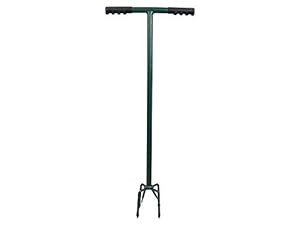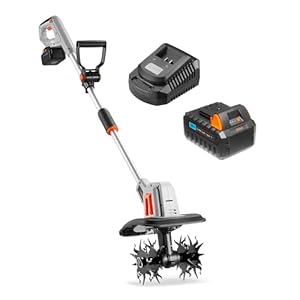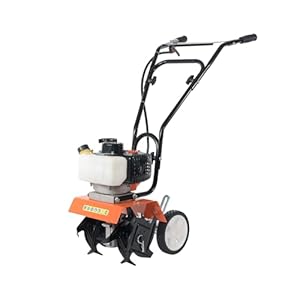The 10 Best Offers for Tillers - February 2026
We already helped 10 million customers this year!
- The garden rotavator is powered by a powerful 150cc hp, 4-Stroke Hyundai OHV petrol engine.
- Our garden cultivator is suitable for preparing seeding beds, and vegetable patches.
- Provides an impressive tilling width of 560mm and tilling depth of 260mm & has a net weight of 29.5kg. The six robust steel rotating tines/blades each have 4 angled teeth and cover a width of 560mm to make fast work, of breaking up and turning over the soil of any type.
- Self-propelled for easy maneuverability with a built in lifting transport wheel. This petrol tiller is designed with user on mind.
- 0.8-1.1L/h fuel consumption at full load.
| Colour | Manufacturer | Weight |
| Blue | HYUNDAI | 29.5 kg |

- Six Strong Prongs - Effectively break up heavy and clay-based soils, making it ideal for soil preparation, ventilation and compost turning at the start of the growing season.
- Strong & Durable Construction - Manufactured with an all-steel construction, the forged carbon steel head is built withstand heavy-duty use, offering maximum strength and long-lasting durability.
- Improved Resistance - The powder coated finish enhances resistance to rust, scratches, humidity and alkaline in the soil, ensuring reliable performance over time.
- Comfortable Use - The long tubular T-shaped handle with indented finger grips provides comfort and control, while helping prevent back ache and fatigue during extended use. With an overall length of 920mm, this cultivator provides excellent leverage and control, making soil cultivation easier and more efficient.
- Faithfull 5 Year Manufacturers Guarantee – An essential multi prong cultivator, ideal for loosening compacted soil in larger gardens, vegetable plots and allotments.
| Colour | Manufacturer | Weight |
| Green | Faithfull | 1.19 kg |

- CORDLESS TILLER: Get ready for gardening season with the VonHaus electric tiller, powered by a long-lasting 4Ah 20V battery with a no-load runtime of 36 minutes. Cultivate your dream garden with cordless freedom today.
- DURABLE STEEL BLADES: The battery rotavator boasts 12 teeth and 4 ultra-sharp angled steel blades, working at 300RPM (no-load speed) to effectively break up and turn over soil up to 16cm deep.
- COMFORTABLE CONTROL: The adjustable D-handle and 20cm working width make the cordless cultivator perfect for precise, ergonomic tilling. Navigate around plants, borders, and narrow rows with ease.
- SAFETY FEATURES: With a dual trigger safety switch and overload protection, our soil tiller ensures safe, reliable use. When engaged, the electric brakes bring the garden rotavator to a smooth and swift stop.
- OUR BRAND PROMISE: Established in 2009, VonHaus is the helping hand you need to craft your dream garden, from the patio floor to the hedge tops. Use our soil cultivator with confidence.
| Colour | Manufacturer | Weight |
| Grey | VonHaus | 5.43 kg |

- CULTIVATE YOUR DREAM GARDEN: Get ready for gardening season with the VonHaus electric tiller, powered by a mighty 1050W motor. Equipped with sturdy handlebars for easy control, cultivate the way to a healthy garden today.
- DURABLE STEEL BLADES: The four ultra-sharp steel blades feature an angled design, working at 380rpm (no-load speed) to effectively break up and turn over the toughest soil up to 22cm deep.
- LARGE WORKING CAPACITY: Cover large areas of your garden with efficiency thanks to the generous 320mm working width. Plus, the 10m cable lets you use the garden cultivator without limitations.
- SAFETY ALL ROUND: With a dual trigger safety switch and overload protection, our garden rotavator ensures safe, reliable use. When engaged, the electric brakes bring the electric rotavator to a smooth and swift stop.
- OUR BRAND PROMISE: Established in 2009, VonHaus is the helping hand you need to craft your dream garden, from the patio floor to the hedge tops. Use our garden tiller with confidence.
| Colour | Manufacturer | Weight |
| Grey, Black, Orange | VonHaus | 8.2 kg |

- Electric garden tiller and rotavator: Perfect for vegetable gardens, smallholdings and allotments
- Breaks up compacted soil easily: Saves you hours of back-breaking digging
- 4 angled teeth covering a width of 360mm : Get the job done quickly and effectively
- Weighs just 9kg: Really easy to move around your garden or allotment
- Extra-long 10m power cable: Ample room without having to reach for an extension lead
| Colour | Manufacturer | Weight |
| Blue | Hyundai Power Products | 8 kg |

- Powerful Brushless Motor Efficient Tilling: The Cordless Soil Tiller features a robust 550W brushless motor, delivering exceptional power for effortless soil cultivation. Whether you're working in small garden beds or larger plots, the motor ensures quick and efficient tilling, allowing you to break up compacted soil with ease.
- Optimal Tilling Depth and Width: This cordless rotavator is designed with a maximum tilling depth of 160 mm(6.3IN) and a width of 230 mm(9IN), making it ideal for various gardening and landscaping tasks. Whether you need to mix compost into your soil or prepare a bed for planting, the tiller’s specifications ensure thorough coverage for optimal soil preparation.
- High-Speed Rotation: With an impressive no-load speed of 360 RPM, this tiller rotavator effortlessly tackles tough soil, ensuring fast and efficient operation. The high-speed rotation allows for smoother soil turnover, reducing your work time and improving soil aeration.
- Cordless Convenience: The cordless design eliminates tangled cables and allows unrestricted movement throughout your garden. Featuring an adjustable telescopic shaft, the tiller can be customised to your height for enhanced comfort, reduced strain, and easier handling during extended use near power outlets.
- Quick Charging and Long-Lasting Performance: The tiller comes with 2*4.0Ah high-capacity lithium batteries and a dedicated fast charger, delivering extended endurance and efficient power management. Dual batteries allow you to keep working with minimal downtime, even during demanding gardening tasks. making it ideal for completing larger gardening tasks, without interruptions.
| Colour | Manufacturer | Weight |
| Red | ONEVAN | - |

- CULTIVATE YOUR DREAM GARDEN: Get ready for gardening season with the VonHaus electric tiller, powered by a mighty 1500W motor. Supported by two rear wheels for precise control, cultivate your way to a healthy garden today.
- DURABLE STEEL BLADES: The six ultra-sharp steel blades feature an angled design, working at 400rpm (no-load speed) to effectively break up and turn over the toughest soil up to 22cm deep.
- LARGE WORKING CAPACITY: Cover large areas of your garden with efficiency thanks to the generous 450mm working width. Plus, the 10m cable lets you use the garden cultivator without limitations.
- SAFETY ALL ROUND: With a dual trigger safety switch and overload protection, our garden rotavator ensures safe, reliable use. When engaged, the electric brakes bring the electric rotavator to a smooth and swift stop.
- OUR BRAND PROMISE: Established in 2009, VonHaus is the helping hand you need to craft your dream garden, from the patio floor to the hedge tops. Use our garden tiller with confidence.
| Colour | Manufacturer | Weight |
| white | VonHaus | - |

- CORDLESS FREEDOM - Annoying power cords are a thing of the past! This 18v battery powered garden tiller is suitable for turning soil in small and medium-sized gardens ready for turf laying or for preparing bedding areas
- ADAPTABLE TO ALL SOIL CONDITIONS – The motorised tiller is equipped with four heavy-duty metal blades that, through the electronic speed control, can be perfectly adapted to the type of ground and the application
- EASY AND COMFORTABLE TO USE – With a working width of 20cm and depth of 15.5cm convenient and fatigue-free tiling work is possible thanks the rotavator's light weight and the softgrip main handle
- ONE BATTERY FOR OVER 300 TOOLS - Our intelligent ABS Battery Electronics and high-performance Li-Ion Cells makes our Rechargeable Battery System one of the safest in the industry and ensures efficiency, reliability and durability
- CORDLESS TILLER ONLY - This is the battery powered Garden Rotavator body only. It requires 1 x 18v Lithium-ion rechargeable battery and charger (Sold Separately)
| Colour | Manufacturer | Weight |
| red / black | Einhell | 3.85 kg |

- 【Anti-Slip Foot Plate - Penetrate Soil with One Tread】- This garden twist tiller comes with anti-slip foot plate, maximize downward force of treading and penetrate into soil eaily. The curved handle of this manual twist tiller saves effort of twisting ergonomically.
- 【Arrow Sharp Tines Makes Aggressive Twist Cultivator】- Twist this garden claw cultivator with the force of body, easily cultivate soil efficiently. Powder coated steel construction makes this twist cultivator strong and durable.
- 【Till for Ventilated Soil & Healthy Plants】- This garden twist tiller loosens, turns, tills and aerates the soil, promoting the free flow of water, air and fertilizer for healthy plants and beautiful garden.
- 【Save Your Back in Raised Bed and Flower Box】- This manual twist tiller is in ideal size for raised bed, flower box, around shrubs or bushes and other narrow areas. You can also use the twist cultivator to mix fertilizer and peat moss amendments. The long handle makes tilling easy without bending over.
- 【Order with Confidence】- Jardineer is devoted to providing reliable and efficient product. Customer satisfaction is always our pursuit. If you have any question about garden twist tiller, please do not hesitate to contact us.
| Colour | Manufacturer | Weight |
| - | Jardineer | 1.81 kg |

- Strong & Reliable 52cc Two-Stroke Petrol Engine
- Tills to a Max Depth of 100mm
- 300mm Tilling Width
- Strong Trines (Blades) and Robust Gearing
- Easy to Set Up and Store
| Colour | Manufacturer | Weight |
| Orange | ParkerBrand.com | - |

General information about Tillers:
Tillers - A Complete Overview
Tillers are essential agricultural tools used for soil preparation and cultivation. These powerful machines are designed to break up the soil, loosen it, and mix in organic matter, creating an optimal environment for planting. With their rotating blades, tillers effectively turn over the top layer of soil, ensuring it is well-aerated and ready for planting. Let's delve deeper into the various aspects of tillers, including their types, benefits, and applications.
Types of Tillers:
1. Front-Tine Tillers: Front-tine tillers feature rotating blades that are positioned in front of the wheels. This design allows the machine to move forward while the blades break up and cultivate the soil. These tillers are perfect for small to medium-sized garden beds, as they are easy to maneuver.
2. Rear-Tine Tillers: Rear-tine tillers are typically more powerful than their front-tine counterparts. They come with wheels and blades located at the back of the tiller, allowing for greater digging depth. These tillers are ideal for larger areas and tougher soil conditions, such as clay or heavily compacted soil.
Benefits of Tillers:
1. Improved Soil Quality: Tillers help improve soil quality by breaking it up and reducing compaction. This encourages better root growth, nutrient absorption, and water drainage. Moreover, tilling mixes organic matter, such as compost or manure, into the soil, enhancing its fertility.
2. Time and Energy Saving: Manual cultivation can be labor-intensive and time-consuming. Tillers automate the tilling process, significantly reducing the effort and time required for soil preparation. They save both time and energy, allowing farmers and gardeners to focus on other essential tasks.
Applications of Tillers:
1. Gardening: Tillers are widely used in home gardens, community gardens, and small-scale agricultural operations. These versatile machines are perfect for preparing garden beds, growing vegetables, flowers, and other plants.
2. Farming: Tillers play a crucial role in large-scale farming operations. They are commonly used for preparing seedbeds, planting row crops, and incorporating fertilizers into the soil. Tillers also aid in managing weeds, as they disrupt weed roots, hindering their growth.
In summary, tillers are indispensable tools for soil preparation and cultivation. With their ability to improve soil quality, save time and energy, and their wide range of applications, tillers are crucial for successful gardening and farming endeavors. Whether you have a small garden or a vast agricultural field, a tiller will undoubtedly prove to be an invaluable investment.
** "Free Delivery" means that this is possible under the given conditions at the time of data retrieval from the relevant provider, but cannot be guaranteed. It is technically not possible to provide information in real-time. The shipping costs may vary under certain circumstances (different provider, place of delivery, etc.). The shipping costs shown in the further ordering process apply.
Other IMPORTANT INFORMATION that we ask you to take note of:
We may receive a commission if you make a purchase via the links on our site. This has no impact on the placement of the products on our site. Our website is part of amazon associates program - Amazon, Amazon Prime, the Amazon Logo and Amazon Prime Logo are registered trademarks of Amazon, Inc. or its affiliates.
Disclaimer:
1. The prices shown may have risen since the time we last updated them.
2. The actual price of the product on the seller’s site at the time of purchase will govern the sale.
3. It is not technically possible for the prices displayed above to be updated in real-time.










